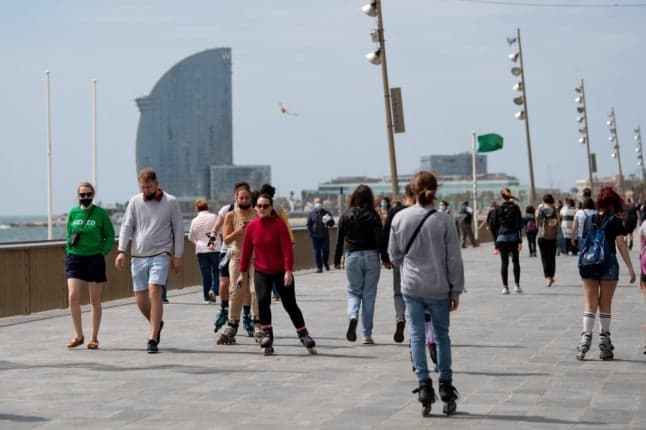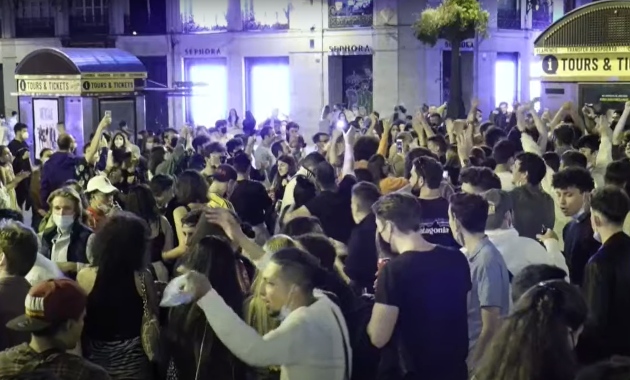ANALYSIS: Does Spain's disorganised easing of restrictions make the pandemic even more unpredictable?

Spain’s uneven lifting of restrictions as well as the lack of caution and clarity by government could be contributing to potential “superspreader” events such as last week’s street parties, Barcelona-based Graham Keeley finds out.
There was an almost palpable sense of relief on the part of the owners when we walked through the doors of the restaurant.
After months of being closed, they were finally back in business at night – when most eateries actually make money.
A friend who has been in the business for years told me that the menú del día at lunch time are a Spanish tradition but restaurants usually make a loss on serving these up.
So, as we settled into our seats for our first meal out for months, we were treated to cava and the chat was friendly.
Perhaps it is always like this but as we were surrounded by empty tables, I had the impression the owners of the restaurant were very glad to have people back.
A pleasure we took for granted now seems very precious to us – eating or drinking out.
Kate Preston, who runs a series of restaurants with her husband in Barcelona, told me things were slowly getting back to some kind of normal.
“The restaurants and bars are filling up slowly, with people mostly on terraces, eating and drinking. There are lots of French tourists,” she said.
“For us it is just great to be open again after being closed for so long.”
This will be the first full weekend across Spain without a curfew or many of the restrictions after the end of the six-month state of emergency.
Authorities have warned people against repeating the scenes from last Saturday when revellers, some without masks, were photographed partying in Madrid, on the beaches of Barcelona and elsewhere.
Christened 'freedom fiestas' by the media, most health experts looked on with concern.
READ MORE:
- VIDEOS: Crowds of young revellers celebrate end of Spain’s state of alarm
- ‘Let’s not lower our guard,’ Spain’s PM urges after street parties mark end of curfew

Rafael Bengoa, a former World Health Organisation health systems director who is now the co-director of the Institute for Health and Strategy in Bilbao, said young people interpreted the end of the state of emergency as the end of the pandemic.
“Young people interpreted it as the pandemic was finished; it is party time. Saturday night probably became a superspreader event,” he said.
“The health system will feel it in a few days. What we should learn from now on should be not to announce news about unlocking every week e.g. this week you will be able to take off masks, next week you can hug, next week you can go to the pub."
Professor Bengoa added: “With the high incidence figures we have in Spain, all those announcements will become an excuse for party time and the virus will spread. It is better to have an organised (relaxation) of lockdown than a disorganised one.”
This touches on perhaps the biggest problem facing Spain: with no national restrictions in place, regions have been left to go it alone.
Take the Canary Islands, which is desperate to bring its contagion rates down, it wanted to keep the curfew but the courts refused.
A popular holiday destination for British tourists, the islands' government wants to bring its coronavirus contagion rate below 50 per 100,000 people – the level set by the UK government to declare a destination safe for travel. Currently it stands at 86.
Spain's Covid-19 contagion rate has been falling steadily for months, with the 14-day rate at 166 per 100,000 people on Thursday.
However, in some regions the contagion rates are much higher.
Around 1,500 extra police will be on duty in Madrid to stop parties which could send the contagion rate higher. The Spanish capital has the second highest contagion rate in the country at 267.42.
In Valencia, which has the second lowest contagion rate in Spain at 32, the regional authorities have asked mayors of coastal towns to avoid the “unfortunate” scenes of last weekend.
Another encouraging sign is that in eight regions, including the Balearic Islands and La Rioja, the death rate has fallen to single figures between April 19 and 25, according to government figures.
Against this background the vaccine rate is proceeding apace.
Already 30 percent of Spaniards have had one dose of the Covid-19 vaccine, while 14.2 percent have received both.
Spanish prime minister Pedro Sánchez has claimed this week the country was within 100 days of achieving herd immunity.
This means the government has fixed August 18th as the date by which 70 percent of the population will be inoculated.
Analysts have suggested tying the country's fate to a date whilst in the midst of an unpredictable pandemic with many coronavirus variants may be foolish.
We shall see.
Comments
See Also
There was an almost palpable sense of relief on the part of the owners when we walked through the doors of the restaurant.
After months of being closed, they were finally back in business at night – when most eateries actually make money.
A friend who has been in the business for years told me that the menú del día at lunch time are a Spanish tradition but restaurants usually make a loss on serving these up.
So, as we settled into our seats for our first meal out for months, we were treated to cava and the chat was friendly.
Perhaps it is always like this but as we were surrounded by empty tables, I had the impression the owners of the restaurant were very glad to have people back.
A pleasure we took for granted now seems very precious to us – eating or drinking out.
Kate Preston, who runs a series of restaurants with her husband in Barcelona, told me things were slowly getting back to some kind of normal.
“The restaurants and bars are filling up slowly, with people mostly on terraces, eating and drinking. There are lots of French tourists,” she said.
“For us it is just great to be open again after being closed for so long.”
This will be the first full weekend across Spain without a curfew or many of the restrictions after the end of the six-month state of emergency.
Authorities have warned people against repeating the scenes from last Saturday when revellers, some without masks, were photographed partying in Madrid, on the beaches of Barcelona and elsewhere.
Christened 'freedom fiestas' by the media, most health experts looked on with concern.
READ MORE:
- VIDEOS: Crowds of young revellers celebrate end of Spain’s state of alarm
- ‘Let’s not lower our guard,’ Spain’s PM urges after street parties mark end of curfew

Rafael Bengoa, a former World Health Organisation health systems director who is now the co-director of the Institute for Health and Strategy in Bilbao, said young people interpreted the end of the state of emergency as the end of the pandemic.
“Young people interpreted it as the pandemic was finished; it is party time. Saturday night probably became a superspreader event,” he said.
“The health system will feel it in a few days. What we should learn from now on should be not to announce news about unlocking every week e.g. this week you will be able to take off masks, next week you can hug, next week you can go to the pub."
Professor Bengoa added: “With the high incidence figures we have in Spain, all those announcements will become an excuse for party time and the virus will spread. It is better to have an organised (relaxation) of lockdown than a disorganised one.”
This touches on perhaps the biggest problem facing Spain: with no national restrictions in place, regions have been left to go it alone.
Take the Canary Islands, which is desperate to bring its contagion rates down, it wanted to keep the curfew but the courts refused.
A popular holiday destination for British tourists, the islands' government wants to bring its coronavirus contagion rate below 50 per 100,000 people – the level set by the UK government to declare a destination safe for travel. Currently it stands at 86.
Spain's Covid-19 contagion rate has been falling steadily for months, with the 14-day rate at 166 per 100,000 people on Thursday.
However, in some regions the contagion rates are much higher.
Around 1,500 extra police will be on duty in Madrid to stop parties which could send the contagion rate higher. The Spanish capital has the second highest contagion rate in the country at 267.42.
In Valencia, which has the second lowest contagion rate in Spain at 32, the regional authorities have asked mayors of coastal towns to avoid the “unfortunate” scenes of last weekend.
Another encouraging sign is that in eight regions, including the Balearic Islands and La Rioja, the death rate has fallen to single figures between April 19 and 25, according to government figures.
Against this background the vaccine rate is proceeding apace.
Already 30 percent of Spaniards have had one dose of the Covid-19 vaccine, while 14.2 percent have received both.
Spanish prime minister Pedro Sánchez has claimed this week the country was within 100 days of achieving herd immunity.
This means the government has fixed August 18th as the date by which 70 percent of the population will be inoculated.
Analysts have suggested tying the country's fate to a date whilst in the midst of an unpredictable pandemic with many coronavirus variants may be foolish.
We shall see.
Join the conversation in our comments section below. Share your own views and experience and if you have a question or suggestion for our journalists then email us at [email protected].
Please keep comments civil, constructive and on topic – and make sure to read our terms of use before getting involved.
Please log in here to leave a comment.